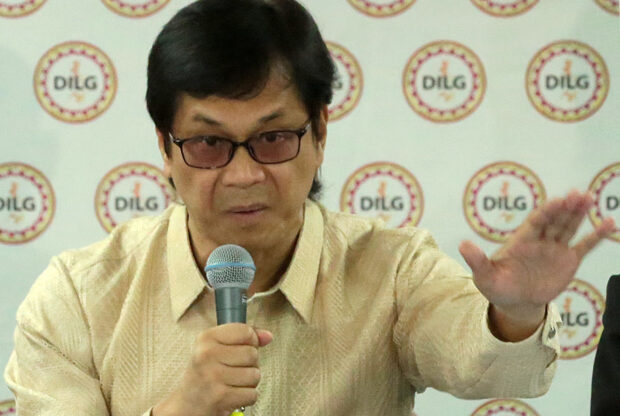Dismiss 4 top cops linked to drugs, Bongbong Marcos asked

Interior and Local Government Secretary Benjamin Abalos, Jr., gestures as he updates media on the findings of the five-man advisory body tasked to review and evaluate the courtesy resignations of Philipine National Police (PNP) high-ranking officials during a news briefing at the DILG headquarters in Quezon City on Monday, May 8, 2023. Abalos revealed that two police generals and two police colonels will face grave misconduct and grave neglect of duty cases.
INQUIRER PHOTO / GRIG C. MONTEGRANDE
“I know it’s a bitter pill to swallow. This will be a painful situation at first, but for me this will lead to a better and renewed police force that is united in fighting illegal drugs.”
The National Police Commission (Napolcom) has asked President Ferdinand Marcos Jr. to accept the resignations of two generals and two colonels for their involvement in illegal drugs.
The recommendation followed the investigation of 953 officials of the Philippine National Police who filed their courtesy resignations last January as part of government efforts to cleanse the police force of the “deeply entrenched” illegal drug problem.
Interior Secretary Benhur Abalos, who sits as ex officio chair of Napolcom, declined to disclose the names of the four officials pending the official transmittal from Malacañang of the President’s action as well as the conclusion “in two to three weeks” of the precharge investigation to determine the criminal and administrative cases to be filed against them.
Abalos added that the police officers were not yet informed of their fate.
During his visit to Washington last week, Mr. Marcos had said that he already accepted the resignation of the two police brigadier generals, as he acknowledged that some government personnel committed abuses during the previous administration’s bloody war on drugs.
While the President did not mention the fate of the two colonels, Abalos said they issued a resolution on Monday to proceed with the precharge investigation against them.
“Napolcom will recommend to the President that he accept these two colonels’ courtesy resignations as well, without prejudice to their administrative liability,” Abalos said during a press conference attended by five members of Napolcom at the Department of the Interior and Local Government (DILG) head office in Quezon City on Monday.
The penalties for these grave offenses are dismissal from service, forfeiture of benefits, and perpetual disqualification from any public office.
Criminal cases, meanwhile, would be handled by the Deputy Ombudsman for Military and Other Law Enforcement Offices.
Newly installed PNP chief Gen. Benjamin Acorda Jr., an ex officio commissioner of Napolcom, said that the four were under floating status in the Personnel Holding and Accounting Unit and “are not holding any key positions.”
Napolcom vice chair Alberto Bernardo confirmed that all four officials had been previously assigned at the Drug Enforcement Group (DEG), the PNP’s main antidrug unit.
917 cleared
Napolcom’s decision essentially adopted all the recommendations of a five-member advisory group, headed by former PNP chief Rodolfo Azurin Jr., constituted to review the profiles of the police officers who submitted their courtesy resignations.
It also followed the recommendation of the independent panel that the courtesy resignations of 917 officials be rejected by the President, effectively clearing them of any involvement in illegal drugs.
Meanwhile, for the 32 remaining generals and colonels, the DILG chief noted that “more investigations are necessary… because it will be a difficult situation if an innocent officer will be wrongly implicated.”
“Rest assured that the Napolcom will carry out its sworn duty to supervise and strengthen our police force,” Abalos pointed out, with the commission’s recommendation to the President finally putting a “proper and clean” ending to one of the government’s biggest internal cleansing of the police force.
Acorda said the PNP respected Napolcom’s decision on the fate of some of its personnel, and assured the 228,000-member police force that the current internal cleansing would be for the good of the organization.
“I know it’s a bitter pill to swallow. This will be a painful situation at first, but for me this will lead to a better and renewed police force that is united in fighting illegal drugs,” Abalos added.
Stricter vetting
Aside from the purge of the police force of scalawags, commanders heading drug enforcement units (DEUs)—from the station level up to the national headquarters—may now be dismissed from service for failing to investigate their personnel who might be involved in illegal drugs.
Acorda said he had implemented a “stricter” background check among all current and incoming antinarcotics police officers as an offshoot of the controversy involving PNP officials in illegal drug trading and recycling.
“The anti-illegal drug campaign shall be done by ensuring the proper vetting of DEG and DEU personnel to make sure that only those who have successfully undergone an honest vetting process will be assigned to anti-illegal drug units,” he told reporters at Camp Crame in Quezon City.
According to PNP spokesperson Col. Jean Fajardo, background checks would no longer be just verbal reports but would be done in writing, with field commanders ordered to officially sign background checks.
“This is to ensure that should problems arise later on, we will hold them accountable for why they recruited antidrug personnel with information linking them to illegal drugs,” she said. “Gone are the days that our background investigations are not given equal importance [in vetting DEU personnel].”
Should records show that a field commander has approved the recommendation and transfer of assignment of any DEU officer within his direct command, then he or she “will be definitely liable… under the doctrine of command responsibility.” INQ
RELATED STORY: